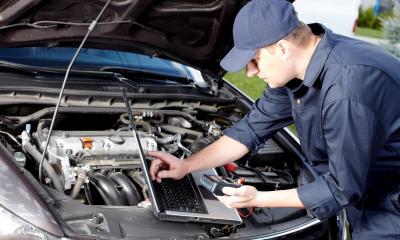
Garages now very rarely just sell fuel and instead offer a range of facilities and services including a forecourt shop, vehicle repairs and servicing and a car wash. Our guide covers the key issues for starting and running your own garage.
- Research your target market
- Establish your customer profiles
- Decide what to sell
- Promote your business
- Buy an existing business
Research your target market
Estimating demand
It's very important to find out how much demand there is likely to be for your business. The first step is to check out the competition. Count how many petrol filling stations there are in your area and visit each of them to see what they offer. Forecourt shops selling a range of convenience lines and food-to-go have proved to be a lifesaver for many petrol filling stations, so it would be a good idea to also check out how many other c-stores not attached to filling stations there are in your area and the range of goods they sell to see whether there's a gap in the market. Remember that supermarkets selling fuel will be very strong competitors so you'll need to make sure there are no existing or proposed supermarket sites close by.
You may be able to obtain details of fuel throughput and income from other product lines for the last 12 months from the previous tenant or proprietor. This will give you an indication of potential demand.
Catchment area
It would be useful to note down the different types of potential customer living, working or staying in the area. This will help you to determine the range of products and services that you will offer. For example, if the business is located in a holiday area you might consider offering a good range of take-away food (freshly baked bread, pies and pasties, cooked chickens and so on) to appeal to people staying in self-catering accommodation. If you are on a busy commuter route it would be a good idea to make sure that you open early in the morning to offer workers newspapers, coffee, breakfast-to-go and other snacks.
Don't forget to check whether there are plans for your area which might reduce the amount of passing trade you will have - for example proposals to build a bypass.
Why will customers choose your petrol filling station
You need to make sure that enough customers will choose your business rather than other filling stations. Look closely at the competition to see:
- what prices they charge
- what services they offer
- what range of products they offer
- what are their opening hours
- what type of customer they are attracting
- how accessible they are
- whether they regularly have queues
- whether the premises are smart and well maintained
This might immediately show you that there is a gap in the market for a certain type of business, for example, offering a well stocked forecourt shop, an electric vehicle charging point or a car wash facility.
Find out what people want
It can be a good idea to talk to people in the filling station's catchment area about your proposals. Ask them what they would like you to offer, and what they don't like about other filling stations.
Research current trends, plus legal and tax issues
Establish your customer profiles
Your market
Your customer base will consist of:
- business and commercial customers
- private motorists
- non-motorists who patronise your forecourt shop
Bear in mind that disabled motorists may need special assistance.
Special offers, discounts and promotions
The petrol retailing sector is very competitive and from time to time you may have to reduce fuel prices during price 'wars'. Your supplier may give you some help by offering a discount off the wholesale price you pay for the fuel. Otherwise any reduction you make to the pump price will eat into your margins.
You might have special offers in your forecourt shop from time to time, perhaps to boost slow moving stock. Don't forget to brief your staff thoroughly on the discounts that can be offered. Guard against staff offering unauthorised discounts to their friends and family.
You are likely to suffer from some customers who fill up but then can't pay for the fuel, or who drive off without paying. It can be difficult to do anything about this but wherever possible the number of the vehicle should be taken and the matter reported to the police. You can read about initiatives to reduce forecourt crime on the British Oil Security Syndicate (BOSS) website.
Decide what to sell
Fuel sales (wet stock sales)
You will be selling petrol (ultra low sulphur petrol (ULSP) and super unleaded petrol) and diesel (extra low sulphur diesel and possibly bio-diesel). You might also sell LPG (Autogas) and paraffin.
Your pumps must comply with legal requirements. The number of nozzles you have will depend on the size of your forecourt. Don't forget that customers do not like long queues so your aim must be to move as many customers as possible as quickly as possible through your site. Make sure that the layout of the site encourages this and that you install rapid flow pumps. You could also consider installing pay-at-pump technology for motorists who only want fuel. As well as speeding up throughput on the forecourt, this also lets motorists buy fuel when the filling station is unmanned.
You might want to consider installing rapid charging points for electric vehicles as the number of alternatively fuelled cars continues to grow.
Shop sales
You are likely to stock a range of motor accessories such as oil, windscreen washer fluid, car care products and so on. More and more filling stations have diversified into convenience retailing - and more recently post office services - in order to attract both motorists and non-motorists to the site. Before deciding on the range of products to stock it would be wise to thoroughly research the convenience store market. You might also decide to offer your customers:
- lottery ticket sales
- console game sales
- hot and cold take-away food sales
- off-licence sales
- garden products
- coal and logs, Calor gas
Other sales
If your site is large enough you might install car washing or valeting facilities as well as the usual water and air lines. If you have the expertise and space you might offer servicing and repairs, MOT testing, body shop work and so on.
Your market research will have helped you to identify the range of products and services to offer. Be prepared to be flexible - your aim is to provide your customers with what they want and after you have been trading for a while it may be clear that different ranges would go down well.
You might also offer certain services like an ATM machine for cash withdrawals, bill payment facilities and parcel collection and return services.
Promote your business
Whichever services you decide to offer to your customers, you must make sure that people know about them. Your site will be very visible and you can build on this by making sure that it is easy to pull on to your forecourt and that customers' attention is drawn to the range of products and services available. A blackboard or other sign advertising freshly baked bread, deals on wine and so on may encourage motorists to stop even if they do not need fuel. Well maintained and accessible facilities such as car wash and airlines will keep local customers coming back.
There are a number of ways in which you can promote your business:
- advertise in your local newspaper and directories if you offer services such as MOT testing, a breakdown service and so on
- launch your own website, listing all the services you offer and your opening hours
- have promotional leaflets printed to leave with local caravan parks and camp sites
- mailshot local households to tell them about the introduction of new services - for example a new electric charging point
- use social media like Facebook and Twitter to tell customers about fuel price cuts, special offers and so on
Buy an existing business
You might decide to buy an existing garage rather than start your own venture from scratch. Buying a going concern can mean that the products, customers, regular sales, staff, premises and equipment are already in place.
But buying a business can be a hazardous, expensive process unless you have the right skills and experience on your team, including legal and financial know-how. Establish the genuine trading and financial position, so that the price you pay for the business is not too high.
Don't forget, you will need to have the site licence transferred from the previous owner at least 28 days before the date of the transfer. There will be a fee for this. Contact your local authority's petroleum licensing department (referred to as the Petroleum Enforcement Authority) for an application form.


